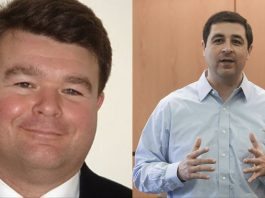The change “takes away most of our ability to track these monsters. I’m left with my jaw wide open” – state Rep. Scott Suder
Judge Susan Crawford helped gut a state law that would have provided lifetime monitoring of the state’s “worst sex offenders,” Wisconsin Right Now has documented. The leftist Madison judge is now running for a seat on Wisconsin’s Supreme Court.
The sex offender monitoring issue came up when Crawford worked as executive assistant to then Gov. Jim Doyle’s Corrections Secretary, Matt Frank, according to newspaper articles from the time, obtained by Wisconsin Right Now through archival research.
“Susan Crawford, executive assistant to Corrections Secretary Matt Frank, said the governor and the agency have concluded GPS tracking isn’t a good tool for monitoring sex offenders who are no longer under government supervision,” a Feb. 15, 2007 article by Todd Richmond of the Associated Press says. It ran in newspapers throughout Wisconsin.

In contrast, her opponent in the Supreme Court race, former Republican Attorney General Brad Schimel, who is a Waukesha County Judge, has produced legal interpretations to allow the lifetime monitoring, as the debate has continued even into this year.
As AG, Schimel argued that “anyone convicted of multiple counts of a sex offense was a repeat offender and automatically fell into the lifetime-monitoring category,” according to the Capital Times. That opinion by Schimel paved the way for lifetime monitoring of sex offenders who were convicted of multiple counts in a single case and was based on a 2005 law.
According to the Capital Times, there are 1,500 sex offenders on lifetime monitoring.
Wisconsin’s sex offender registration statute requires “lifetime registration when a ‘person has, on 2 or more separate occasions, been convicted . . . for a sex offense,'” a 2023 court decision reads. Three liberal justices and Justice Brian Hagedorn formed the majority; they interpreted that passage to the favor of sex offenders.
The liberal-controlled court ruled that a sex offender could not be ordered to wear GPS monitoring for life in such instances because “separate occasions” did not refer to multiple counts stemming from the same case. The decision was so extreme that even Gov. Tony Evers-run Department of Corrections has been working with Republican legislators to rewrite state law so that sex offenders can be subject to lifetime monitoring again, despite that decision.
Schimel’s election in April would shift the control of the court in favor of conservatives. Crawford’s would solidify the liberal majority.
As a judge in Dane County, the leftist Crawford has pledged to utilize “alternatives to incarceration,” and support the expansion of “diversion programs” that give offenders “a chance to avoid a conviction.” In one case, she gave a convicted child molester only four years in prison when he could have served more than 100; he is already out on the streets despite molesting two girls, ages 6 and 7, in a Middleton swimming pool.
Wisconsin Right Now has taken the lead in analyzing Crawford’s record.
And it turns out that she was part of an effort to scale back the lifetime monitoring of sex offenders during the tenure of a different governor, Democrat Jim Doyle. Crawford’s leftist approach to criminal justice extends far back in time.
The AP article reported that Doyle’s budget proposal in 2007 “dramatically scaled back” electronic tracking “for Wisconsin’s worst sex offenders.” It was a bill that Doyle had signed less than a year before.
The articles make it clear that Crawford wasn’t just a bystander in Doyle’s decision to gut the sex offender monitoring law because she used collective voice in describing the analysis of it.

Doyle had signed the bill before switching and moving to scale it back during his budget proposal less than a year later. Asked why Doyle didn’t realize the concerns before he signed it, Crawford told the Associated Press, “It took a lot of analysis on our part. The bill went through the Legislature rather quickly.” That’s even though the AP said the bill “spent about 10 months in the Legislature. The governor signed it four days after he got it.” Doyle was running for re-election when he signed it. Crawford held a number of top roles in Doyle’s administration over the years.
Republican State Rep. Scott Suder, who authored the law, told the news media at the time that Doyle’s change “takes away most of our ability to track these monsters. I’m left with my jaw wide open. He signed the bill. He highlighted the bill throughout his campaign. Now he is nothing short of gutting this bill. I find it appalling.”

Doyle’s plan also allowed Corrections to choose “passive monitoring” of sex offenders instead of “active monitoring.” Active monitoring sends “real-time updates” of the offender’s location and in passive monitors a list “of the offender’s locations” could be downloaded from when the tracker was recharged, according to a 2007 article in the Capital Times by the AP.

Crawford told the media that there were “defects” in the law.
The original law would “set up GPS tracking” until a child molester or sexually violent offender died “or was too feeble to pose a threat,” the article stated. Doyle scaled that back to require them to wear the GPS bracelets “only while they’re on supervised release or parole.” Offenders “on lifetime supervision” would be subject to lifetime tracking, the AP reported.
The about-face came after three UW-Madison professors complained that the new state law “violates privacy rights,” according to an Associated Press article from Feb. 8, 2007.
The law would force “sexual predators to wear tracking devices for the rest of their lives,” according to the article.
The professors, Walter Dickey, Byron Lichstein, and Meredith Ross, labeled the law an example of “governmental intrusion into personal privacy.”

In that article, Suder, of Abbotsford, called the professors “Monday morning quarterbacks” with weak arguments who “might want to talk to the victims of these crimes before they make such outrageous statements. Nothing is going to stop us from implementing GPS. We are on very solid constitutional grounds.”
The law required the Department of Corrections “to use global positioning technology to track offenders found to be sexually violent. Tracking would begin when they’re released from prison and continue for the rest of their lives. The requirement would also extend to serious child molesters,” the AP reported.
The professors also expressed concern for the sex offenders, writing, “constant lifetime GPS tracking is physically and psychologically burdensome.”
Only one member of the state Assembly voted against the law, according to the AP, then state Rep. Mark Pocan, a Democrat who is now a U.S. congressman.
At the time, Crawford was the executive assistant for Corrections Secretary Matthew Frank.
The AP reported that Crawford said, “Corrections has run into a myriad of problems as it prepares to implement the bill.”
An article in the Republican Eagle from 2007 put it this way:
“Gov. Jim Doyle no longer wants to monitor Wisconsin’s worst child sex offenders once they’ve done their time. The new state budget Doyle gave legislators this week only requires GPS satellite tracking of offenders while they’re on parole or supervised release.
Susan Crawford, state corrections’ official, has said her department cannot make sex offenders wear the tracking devices once they’ve paid their debts to society. And it would not do much to stop them from re-offending anyway, because it would only produce evidence after the fact.”
“Suder had accused the corrections’ agency of staging” the professors’ complaints, “something the department has denied,” the article said.











![WATCH: Elon Musk Town Hall Rally in Green Bay [FULL Video]](https://www.wisconsinrightnow.com/wp-content/uploads/2022/04/Elon_Musk_3018710552-265x198.jpg)
